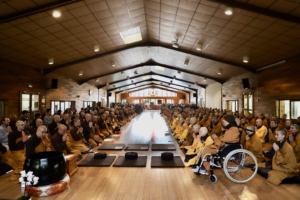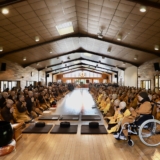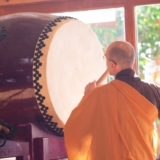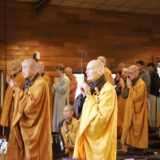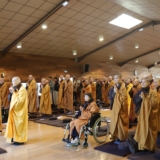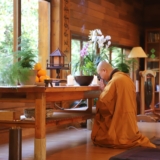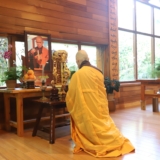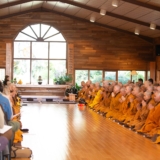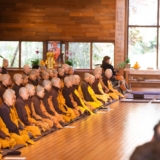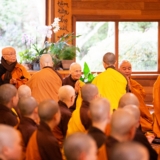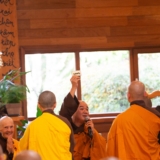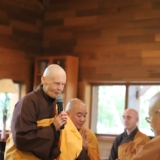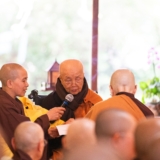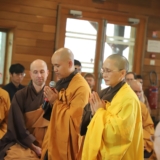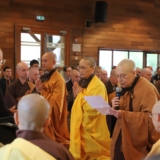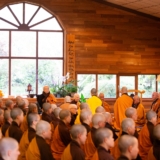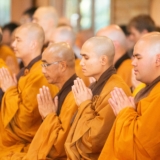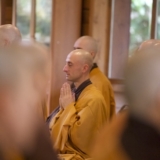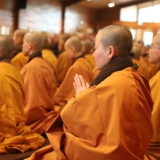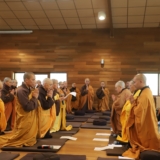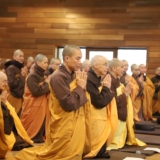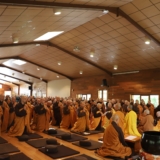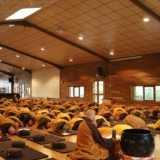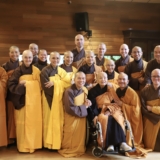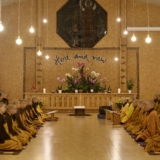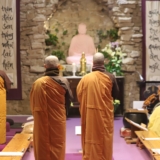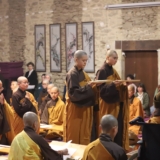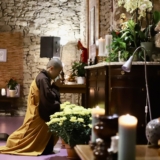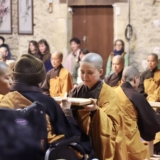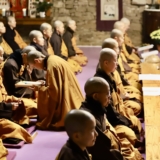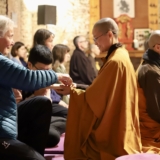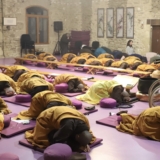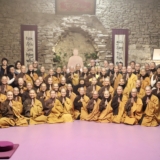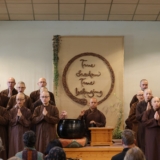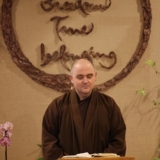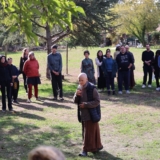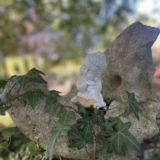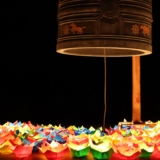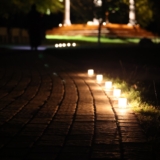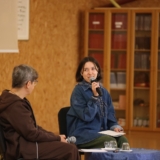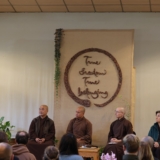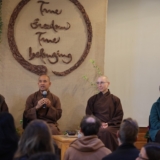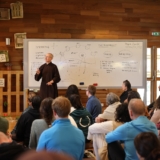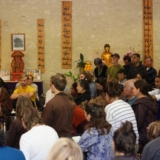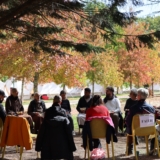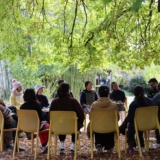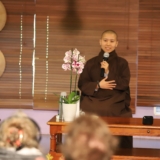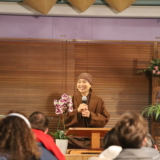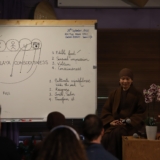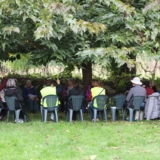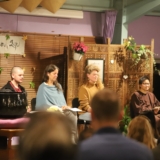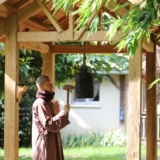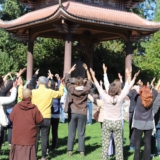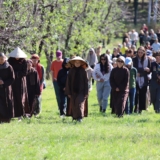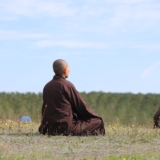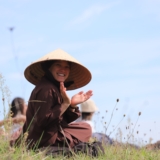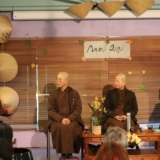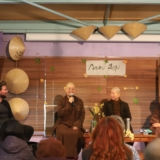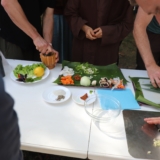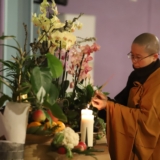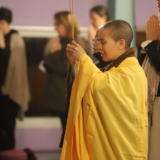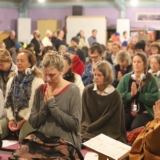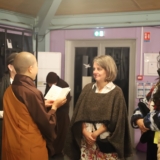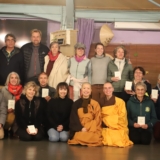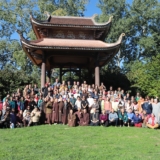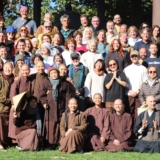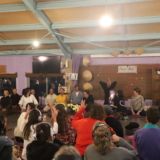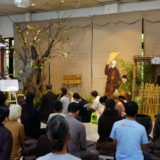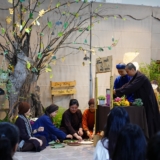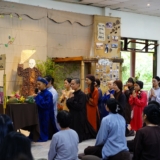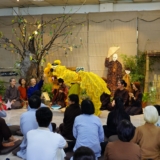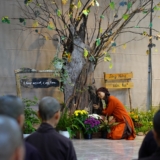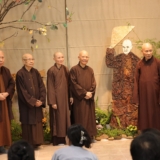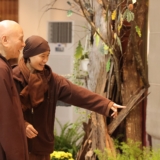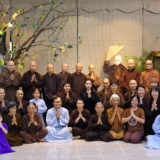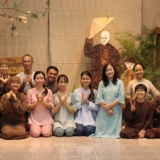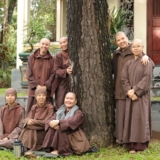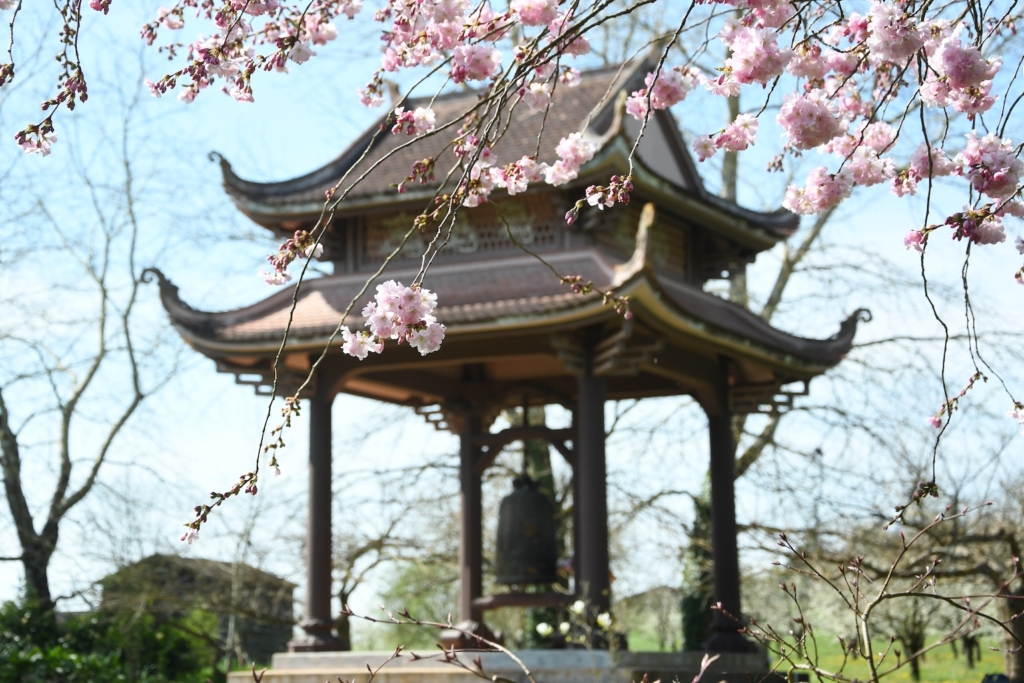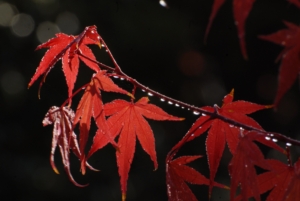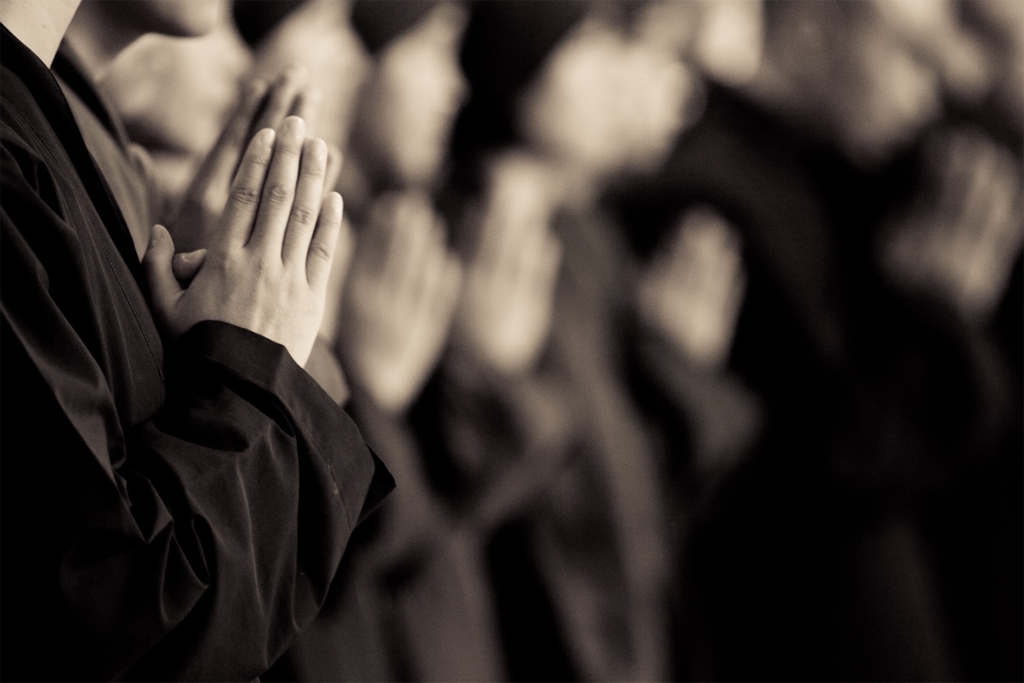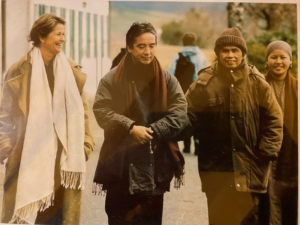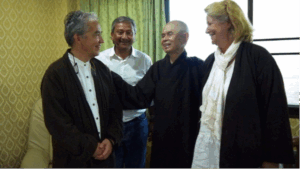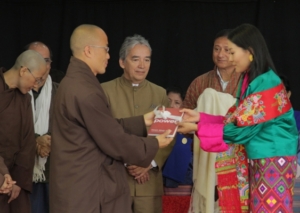Lễ Đối thú An cư kiết đông 2025 -2026
Khi sắc trời bắt đầu chuyển màu lá vàng, đỏ rực rỡ khắp các nẻo đường như báo hiệu một mùa thu mới đang về. Trong màn sương trong vắt tĩnh lặng của sáng ngày 23 tháng 10, tứ chúng Làng Mai đã vân tập về thiền đường Nước Tĩnh, chùa Pháp Vân, Xóm Thượng để làm lễ đối thú, khai mạc khoá tu An cư kiết đông 2025 – 2026.
Khoá An cư kiết đông được mở đầu bằng ba hồi chuông trống Bát nhã hùng tráng vang lên hoà trong không khí trang nghiêm tĩnh lặng của thiền đường. Tất cả đều như hướng về đức Bổn Sư, hướng về người Thầy kính thương, nguyện một lòng thu nhiếp thân tâm cho 90 ngày hạ thủ công phu. Tất cả cùng nhau trở về ngôi nhà tâm linh để cùng thực tập, làm mới chính mình và nuôi lớn chí nguyện, làm lớn lên Bồ Đề Tâm trên con đường phụng sự cũng như cơ hội để được sống chậm lại, nuôi dưỡng tình huynh đệ và yểm trợ nhau trên con đường chuyển hoá.
Mùa An cư năm này, tại chùa Pháp Vân – xóm Thượng có 40 vị Tỳ kheo, 9 vị Sadi và 56 vị cận sự nam, tổng cộng là 105 vị; tại chùa Cam Lộ – xóm Hạ có 56 vị Tỳ kheo ni, 5 vị Sadini, 1 tập sự nữ và 21 vị cận sự nữ, tổng cộng là 83 vị; tại chùa Từ Nghiêm – xóm Mới có 46 vị Tỳ kheo ni, 3 vị Sadini và 12 vị cận sự nữ, tổng cộng là 61 vị. Như vậy, số người an cư tại đạo tràng Mai Thôn trong mùa An cư kiết đông năm nay là 249 vị (159 xuất sĩ và 90 cư sĩ), tất cả đều sẽ an trú và tu tập miên mật trong 90 ngày.
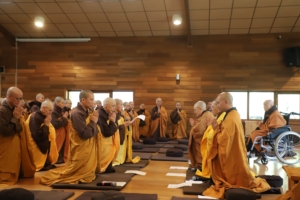
Trong buổi lễ Đối thú, thầy Pháp Ứng, một vị giáo thọ lớn của Làng đã có những lời chia sẻ, khích lệ tinh thần thực tập cho đại chúng:
“Đây là một giây phút hạnh phúc!
Con thấy mình may mắn vì được sống trong truyền thống an cư ba tháng này. Đó không chỉ là cơ hội để tu tập mà còn là tình thương, là sự bảo hộ, che chở của chư Bụt, của tổ tiên, của đất Mẹ và cả muôn loài.
Con thấy rất hạnh phúc, biết ơn và trân quý sự có mặt của Ni Trưởng cùng các quý Sư Anh, Sư Chị lớn vẫn luôn làm chỗ nương tựa vững chãi và đầy tình thương cho các thế hệ Sư em.
Và, khi nhìn vào Tăng thân, nhìn vào các thế hệ xuất sĩ trẻ, con cũng có rất nhiều niềm tin bởi mọi người luôn sống, tu học và làm việc trong sự hoà điệu, hỗ trợ nâng đỡ lẫn nhau và làm nơi nương tựa cho rất nhiều vị thiền sinh khắp nơi trên thế giới. Mỗi chúng ta đều là sự tiếp nối đẹp của Thầy và sẽ mãi đem Thầy đi về tương lai bằng chính sự thực tập, sự sống chánh niệm của mình.”
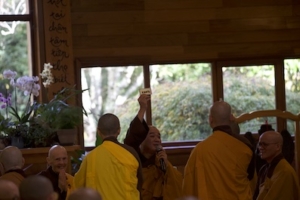
Bên cạnh đó, thầy cũng đã chia sẻ khuyến khích đại chúng trở về lại với sự thực tập 100% – một sự thực tập được thiết kế bởi Sư Ông Làng Mai “100% đó là tình thương và là ước mong của Sư Ông”, mong chúng ta bước đi thật trọn vẹn trong từng bước chân, an trú nơi từng hơi thở trong giờ phút hiện tại. Bình an và hạnh phúc là món quà tốt đẹp nhất mà ta có thể hiến tặng cho những người mình thương yêu và cho thế giới. Đó là pháp ấn của Làng Mai.”
Trong mùa An cư này, đại chúng sẽ có cơ hội tiếp tục chương trình từ mùa An cư năm ngoái, đó là sẽ cùng nhau nghe lại những bài giảng của Thầy Làng Mai trong mùa An cư kiết đông 2012 -2013 với chủ đề “Tri kỷ của Bụt”. Đây là cơ hội quý báu cho mỗi người được học hỏi, chia sẻ trao đổi những kinh nghiệm và áp dụng những tuệ giác mà Thầy đã hết lòng truyền trao để ai cũng có thể trở thành Tri kỷ của Bụt – Tri kỷ của Thầy.
Xem thêm hình ảnh buổi lễ Đối thú An cư kiết đông 2025 – 2026
Lễ đối thú An cư kiết đông 2025 – 2026
Khi sắc trời bắt đầu chuyển màu lá vàng, đỏ rực rỡ khắp các nẻo đường như báo hiệu một mùa thu mới đang về. Trong màn sương trong vắt tĩnh lặng của sáng ngày 23 tháng 10, tứ chúng Làng Mai đã vân tập về thiền đường Nước Tĩnh, chùa Pháp Vân, Xóm Thượng để làm lễ đối thú, khai mạc khoá tu An cư kiết đông 2025 – 2026.
Khoá An cư kiết đông được mở đầu bằng ba hồi chuông trống Bát nhã hùng tráng vang lên hoà trong không khí trang nghiêm tĩnh lặng của thiền đường. Tất cả đều như hướng về người Thầy kính thương, nguyện một lòng thu nhiếp thân tâm cho 90 ngày hạ thủ công phu. Tất cả cùng nhau trở về ngôi nhà tâm linh để cùng thực tập, làm mới chính mình và nuôi lớn chí nguyện, làm lớn lên Bồ Đề Tâm trên con đường phụng sự cũng như cơ hội để sống chậm lại, nuôi dưỡng tình huynh đệ và yểm trợ nhau trên con đường chuyển hoá. Đại chúng đã rất hạnh phúc và trân quý sự có mặt của Ni Trưởng cùng các quý Sư Anh, Sư Chị lớn vẫn luôn làm chỗ nương tựa vững chãi và đầy tình thương cho các thế hệ xuất sĩ trẻ.
Khoá tu Chăm sóc Đất Mẹ, Làng Mai(từ 03/10/2025-10/10/2025)
Đất Mẹ kính thương,
Chúng con là những đứa con bé nhỏ của Mẹ, có may mắn được tiếp xúc với Chánh pháp. Nhờ vậy, chúng con nhận ra mối liên hệ thật gần gũi và sâu sắc giữa mình và Mẹ.
Chúng con đang cùng nhau nuôi dưỡng những hạt giống tỉnh thức nơi mỗi người, với ước mong nhân loại có thể chung tay bảo vệ và chăm sóc cho Mẹ. Ước nguyện ấy rất đẹp, nhưng con đường đi tới đôi khi không dễ dàng. Có lúc chúng con cảm thấy mệt mỏi và nản lòng, vì những gì mình làm dường như quá nhỏ bé trước những biến động ngoài kia. Nhưng chính trong những giây phút yếu đuối ấy, chúng con lại được trở về nương tựa nơi Mẹ. Chỉ cần dừng lại và thở, chúng con đã tiếp xúc được với tình thương của Mẹ.
Chúng con thấy Mẹ trong những bông hoa rực rỡ mùa hạ, trong chồi non vươn lên giữa gió lạnh mùa đông, trong chiếc lá vàng của mùa thu và trong tiếng chim vui hót mỗi sớm mai. Mẹ đang dạy chúng con về sự kiên định, nhẫn nại và bao dung. Mẹ vẫn âm thầm sáng tạo và nuôi dưỡng muôn loài.
Trong khóa tu này, chúng con – những người xuất sĩ và hơn 200 nhà hoạt động bảo vệ môi trường – đã cùng nhau bước những bước chân bình an, thở những hơi thở nhẹ nhàng, chia sẻ với nhau những nỗi niềm từ sâu thẳm trái tim và cả những giọt nước mắt trong các buổi pháp đàm.
Nhờ Mẹ, chúng con có cơ hội gặp nhau, hiểu nhau và nâng đỡ nhau trên con đường trị liệu và chuyển hóa.
Tất cả những hoa trái mà chúng con gặt hái được trong Khóa tu Chăm sóc Đất Mẹ (Climate Retreat) từ ngày 03 đến 10 tháng 10 năm 2025 tại Làng Mai Pháp, chúng con xin thành tâm hồi hướng về cho Mẹ.
Chúng con và Tăng thân xin nguyện:
Ở lại với Mẹ, gìn giữ và chăm sóc cho Mẹ. Để Đất Mẹ tiếp tục biểu hiện thêm những vị Bụt và Bồ Tát, làm cho thế giới này ngày càng tươi đẹp và an lành hơn.
Chiều nay đi thiền hành, chúng con ý thức rằng mỗi bước chân đều đang tiếp xúc với Mẹ. Mẹ có trong chúng con, và chúng con có trong Mẹ. Chúng con không đi tìm một vị Bồ Tát xa vời trên mây, bởi Bồ Tát lớn đang có mặt ngay dưới mỗi bước chân của chúng con.
Bộ lịch thư pháp Làng Mai 2026 – Lòng đất nở hoa trời
“Trên mảnh đất tâm, hoa hiểu biết và thương yêu nở.”
– Thiền sư Thích Nhất Hạnh
Một năm mới bắt đầu từ sự trở về
Khi xuân về, vạn vật như được làm mới – cành cây đâm chồi, hoa lá nở rộ, lòng người nhẹ nhõm. Trong khoảnh khắc giao mùa ấy, “Lòng đất nở hoa trời” – một hình ảnh đầy chất thơ gợi mở mối liên hệ sâu sắc giữa “đất” (thân tâm ta, nơi tiếp xúc với hiện tại) và “trời” (chánh niệm, an nhiên, hiểu biết và từ bi).
Hạnh phúc không ở đâu xa, mà hiện hữu ngay nơi từng bước chân, từng hơi thở. Khi ta biết trở về, sống sâu sắc và thật sự tiếp xúc với hiện tại – đất hóa trời, khổ đau hóa an lạc, hoa giác ngộ nở rộ từ trong lòng đất mộc mạc.
Bộ lịch thư pháp 2026 – Món quà nuôi dưỡng thân tâm
Năm nay, Tăng thân Làng Mai cùng Thái Hà Books trân trọng gửi đến bạn ấn phẩm lịch đặc biệt với chủ đề “Lòng đất nở hoa trời”. Mỗi tờ lịch không chỉ là một mốc thời gian, mà còn là một cánh cửa nhỏ dẫn về chánh niệm – nhắc ta dừng lại, thở sâu và sống thật.
Mỗi tháng – Một thông điệp nuôi dưỡng
Bộ lịch gồm 12 thông điệp thư pháp nhẹ nhàng, sâu sắc từ Thiền sư Thích Nhất Hạnh như: Thở đi con, thở thật sâu thật chậm, không sao đâu; Lắng nghe; Con về nương tựa đất Mẹ; Lòng hôm ấy sẽ là lòng muôn thuở; Đây là một giây phút hạnh phúc… kết hợp cùng tranh hoa sen của hoạ sĩ Trịnh Lữ – biểu tượng của giác ngộ và thanh tịnh, nở lên từ lòng đất, như nhắc ta: hạnh phúc và hiểu biết có thể bắt đầu từ chính nơi ta đang đứng.
Hai phiên bản lựa chọn:
- Lịch treo tường: Trang nhã, thiền vị – tô điểm không gian sống thêm nhẹ nhàng.
- Lịch để bàn: Gọn gàng, tinh tế – đồng hành nơi bàn làm việc hay góc thiền riêng.
Món quà tinh thần cho chính bạn và người thương
Hãy để bộ lịch “Lòng đất nở hoa trời” trở thành người bạn đồng hành trong năm mới – nhẹ nhàng nhắc nhở bạn quay về với chính mình, mỗi ngày.
Tham khảo thông tin bộ lịch tại đường dẫn này: Bộ lịch thư pháp Làng Mai “Lòng đất nở hoa trời” – Bính Ngọ 2026
Khoá tu nấu ăn "Thưởng Thức Cuộc Sống" tại xóm Mới năm 2025
“Thưởng Thức Cuộc Sống – Savor Life” là chủ đề của khoá tu nấu ăn trong chánh niệm năm nay diễn ra từ ngày 26.09 – 03.10.2025 tại xóm Mới đã thu hút hơn 120 vị thiền sinh đến tham dự. Mặc dù với chủ đề về nấu ăn nhưng các vị thiền sinh không chỉ đã được học cách nấu những món ăn ngon, học cách chế tác niềm vui trong khi làm bếp mà còn là những sự thực tập cần thiết, học cách đem chánh niệm, lòng biết ơn, sự có mặt trọn vẹn trong từng khoảnh khắc để tạo nên một đời sống lành mạnh, hạnh phúc cho bản thân, gia đình và xã hội.
Dưới đây là một vài khoảnh khắc được ghi lại: Một tuần trọn vẹn với sự thực tập chánh niệm, trong một năng lượng cộng đồng tràn đầy niềm vui, sáng tạo và mỗi khoảnh khắc đều là một lời mời gọi sống chậm lại, kết nối và trân trọng sự sống. Kính mời đại chúng cùng thưởng thức và tận hưởng những niềm vui từ khoá tu:
Ngày Tiếp nối của Thầy – Viết tiếp giấc mơ Thầy
(Tường thuật ngày Tiếp nối của Thầy, 11 tháng 10 năm 2025, tại Làng Mai Pháp và Diệu Trạm – chùa Tổ)
Gió thu khẽ lùa qua những hàng cây, mang theo hơi lạnh đầu mùa. Màu vàng, màu đỏ, màu cam dần xuất hiện trên những tán lá xanh, như lời nhắn rằng đất trời đang chuyển mình. Trong tiết thu ấy, tất cả những người đệ tử – xuất gia cũng như tại gia – đều hướng về Thầy, nhân Ngày Tiếp Nối của Người.
Trước đây, Thầy chưa từng quen với việc được tổ chức sinh nhật. Thế nhưng, đứa con nào của Thầy cũng đều mong được có mặt bên Thầy trong ngày đặc biệt ấy. Vì vậy, Tăng thân đã âm thầm tổ chức Ngày Tiếp Nối cho Thầy lần đầu tiên khi Người tròn 80 tuổi vào năm 2006. Từ đó, Ngày Tiếp Nối của Thầy đã trở thành một dịp để Thầy trò được quây quần bên nhau, cùng tận hưởng những phút giây ấm áp của tình thầy trò và tình huynh đệ. Đó cũng là những khoảnh khắc mà chúng con luôn thầm hỏi: “Chúng con đã tiếp nối Thầy như thế nào trong đời sống của mình?”
Chúng con cùng ngồi lại kể cho nhau nghe những kỷ niệm về Thầy. Ân tình Thầy trao đã thấm nhuần nơi mảnh đất tâm của chúng con, nuôi lớn thêm sắt son và bền bỉ chí nguyện độ đời và những bàn tay phụng sự. Mỗi mẩu chuyện là một gia tài vô giá, nhất là với những sư em chưa từng có cơ hội gần Thầy. Từ những tình cảm chân thành, ấm áp của các sư cha, sư mẹ, sư anh, sư chị dành cho Thầy mà các em tiếp xúc được với hình dáng Người rõ nét hơn. Như ngày xưa, Thầy đã kể cho chúng con nghe về Sư Cố, về chùa Tổ để hàng con cháu chúng con tiếp xúc được với gốc rễ của mình.
Thầy đang thở bằng hai lá phổi của con
Thầy đang đi bằng đôi chân của con
Từng bước chân thiền hành trở nên cẩn trọng, chậm rãi và trọn vẹn. Chúng con thật hạnh phúc vì luôn có Thầy đồng hành, đưa đường dẫn lối trong đời sống tâm linh. Chỉ cần bước một bước chân chánh niệm, chúng con biết Thầy đang có mặt trong con, rằng:“Thầy chưa bao giờ bỏ mặc con đâu.”
Tất cả hoa trái của sự thực tập là món quà quý báu nhất mà chúng con dâng lên Thầy. Và Thầy đang mỉm cười khi thấy chúng con – tương lai của Thầy – đang cùng đi như một dòng sông, có hòa hợp và thương yêu.
Ở chốn Tổ, nhớ về một giai đoạn trong cuộc đời Thầy, Tăng thân Từ Hiếu – Diệu Trạm đã cùng tìm hiểu những ngày ban sơ của Làng qua vở kịch “Làng Hồng ở đâu?” trong không khí thân tình và ấm áp với sự có mặt của Chư Tôn Đức: Hòa thượng trước Giác sau Quang (Trú trì Tổ đình Bảo Lâm), Thượng tọa trước Từ sau Đạo (Giám tự Tổ đình Từ Hiếu), Ni trưởng trước Như sau Minh (Trú trì chùa Pháp Hỷ), Ni trưởng trước Diệu sau Đạt (Trú trì chùa Đông Thuyền), Ni trưởng trước Từ sau Nhu (Trú trì chùa Từ Đức). Quý ngài là những tấm lòng tri kỷ của Thầy và cũng là những bàn tay che chở yêu thương cho tất cả chúng con.
Những dòng chia sẻ và cảm nhận của các sư em Diệu Trạm sau khi có mặt trong buổi sinh hoạt mừng Ngày Tiếp Nối của Thầy đã nuôi dưỡng chúng con rất nhiều.
“Năm nay, với mong ước được tiếp nối công trình xây dựng Tăng thân của Sư Ông, chúng con đã cùng tìm về gốc rễ của Làng Mai, về những ngày đầu thành lập Làng. Những câu chuyện nhỏ đã được chúng con khám phá và góp nhặt từ những cuốn sách, bài giảng và tài liệu thời đó như: Phép lạ của sự tỉnh thức, Tý – Cây tre triệu đốt & Chiếc lá ổi non, Tuổi trẻ, tình yêu & lý tưởng, Tương lai văn hóa Việt Nam, Về Việt Nam, Lá thư Làng Hồng,… Tất cả tạo cho chúng con rất nhiều hứng thú để tái hiện lại khung cảnh Làng Hồng.
Trong bài pháp thoại chủ đề “Về Việt Nam” tại Làng Hồng, Sư Ông từng dạy: “Nếu chưa tiếp xúc được với gốc rễ, căn cước và bản sắc của ta thì ta vẫn còn cảm giác bơ vơ lạc lõng và vẫn còn lận đận đi tìm một quê hương để về”. Chúng con đã mượn câu chuyện có thật của Châu Như Sa – sư em Chân Bổn Hạnh – người Đức gốc Việt để qua đó thể hiện giấc mơ của Sư Ông về việc xây dựng một quê hương tâm linh cho người con Việt Nam xa xứ trở về nương tựa. Làng Hồng thuở đó đã có những sinh hoạt hướng về tâm linh và dân tộc giúp cho người lớn và đặc biệt là các em thiếu nhi được tiếp xúc, bồi đắp và gìn giữ gốc rễ văn hóa Việt Nam của mình. Vì vậy, lớp học văn hóa thiếu nhi, các buổi lễ Mừng Trăng Lên, lễ Cúng Gia Tiên được sống lại với trọn vẹn nguồn gốc và ý nghĩa qua các hoạt cảnh ngày hôm ấy.
Đại chúng hòa vào không khí Làng Hồng năm 1986. Mọi người cùng cười rộ lên khi nghe tiếng rao hàng của “cô Chín” ở quán Cây Sồi, khi những thiếu nhi như “Tý ba chỏm” cùng Miêu, Trang, Thơ,… xuất hiện trên sân khấu. Nhiều người đã xúc động khi nghe lời khấn nguyện của Bác Cả cùng hình ảnh những người dân Làng đồng loạt lạy xuống trước bàn thờ Tổ Tiên. Và không ít giọt nước mắt đồng cảm của những bạn trẻ thấy hình bóng mình trong những xung đột, chấp nhận và chuyển hóa của Như Sa.
Để từ đó, hành trình trở về không phải chỉ dành riêng cho những người con xa quê hương, dân tộc mà còn dành cho cả những con người đang bơ vơ trong những cuộc kiếm tìm, tìm về nhà, tìm về nơi mình cảm thấy an toàn, nơi mình không còn có cảm giác là một đứa con đi hoang nữa. Chỉ từ giấc mơ bình dị ban đầu, Làng Hồng đã như đóa bồ công anh bay xa với những cánh dù tinh khôi. Làng Hồng đã lên đường và hóa thân trở thành rất nhiều mảnh đất thân thương mà nơi đó mọi người có thể trở về để tìm lại chính mình, để chuyển hóa khổ đau và chế tác hạnh phúc. Làng Hồng đang có mặt ở nơi đây, ngay giờ phút này.
“Chúng con rất hạnh phúc vì sáng hôm đó có sự hiện diện của Chư Tôn Đức – quý ngài đã luôn có mặt, hộ trì và làm nơi nương tựa cho chúng con, để chúng con có thể bước tiếp được con đường mà Sư Ông đã khai sáng. Chư Tôn Đức đã kể cho chúng con nghe những câu chuyện ấm áp ngày xưa với Sư Ông, nhắc lại những lời dạy sâu sắc của Sư Ông và dạy chúng con phải biết tiếp nhận và làm giàu thêm những vốn liếng ấy. “Sư Ông ở trong chính quý vị”- khắc ghi lời dạy ấy, chúng con xin nguyện tu học và thực tập cho đàng hoàng, nguyện cùng nhau nuôi dưỡng niềm tin và hạnh phúc, nguyện tiếp nối con đường của Sư Ông để có thể làm nơi trở về cho nhiều người. Chúng con kính cầu nguyện Chư Tôn Đức có thật nhiều sức khỏe và bình an, có mặt lâu dài với chúng con, để làm nơi nương tựa cho chúng con và cho muôn người.
“Để có được không khí ngày Tiếp Nối Sư Ông hôm đó, các sư chị sư em chúng con đã cùng chơi và làm việc với nhau trong suốt nhiều ngày. Chúng con ai cũng muốn được dâng lên Sư Ông những bông hoa thơm thảo nhất. Tình thương của quý sư mẹ dành cho Sư Ông đã truyền cho chúng con rất nhiều cảm hứng và niềm vui trong khi chuẩn bị. Thiền đường Hương Cau đã chứa đựng một Làng Hồng thu nhỏ. Bất kỳ ai có kỷ niệm với Làng Hồng, hay đã từng nhìn thấy tấm ảnh có bảng tên “Làng Hồng – Xóm Hạ” đều xúc động khi bước vào thiền đường trong những ngày ấy. Mô hình “Sư Ông và thiếu nhi” là một nét đặc biệt khi được tạo nên từ những chiếc lá đầu thu khắp núi đồi Dương Xuân. Sắc vàng, sắc nâu mộc mạc của những chiếc lá đùng đình, lá sen, lá tre, lá mít, vỏ thông,… đã được những bàn tay khéo léo của các sư chị, sư em vẽ thành một bức tranh hài hòa, thân thương. Bên một góc nhỏ, bộ ảnh “Thức dậy giữa Làng Hồng” đã có thể giúp đại chúng về đặt chân lên những con đường thiền hành cũng như cảm nhận được năng lượng sinh hoạt đầy thanh tịnh và an lạc của dân Làng. Không còn khoảng cách không gian và thời gian, tất cả mọi người như đang thực sự có mặt nơi Làng Hồng.”
Thầy kính thương, giờ phút này lòng chúng con ngập tràn hạnh phúc và biết ơn khi chúng con đang được che chở trong vòng tay của Thầy và Tăng thân. Chúng con là sự tiếp nối của giấc mơ làng Hồng và cũng là tương lai của giấc mơ ấy. Chúng con đang thở cho Thầy, chúng con như đang cảm nhận Thầy đang ân cần đặt bàn tay của Thầy vào trong bàn tay nhỏ bé của chúng con, như một sự tin cậy, như một lời gửi gắm và hộ trì. Chúng con sẽ bước tiếp con đường này, dù còn nhiều vụng về yếu kém, nhưng làm chung với nhau, chúng con tin rằng mình có thể đem Thầy đi về tương lai.
“Mình sẽ cùng nhau trăm ngàn đời nữa
Thành ngân hà sáng ngời giữa không gian
Còn gì cao quý hơn tình yêu ấy
Cùng trời cuối đất rọi khắp mọi nơi
Chiều chiều sớm sớm muối dưa chay lòng
Thầy mãi cùng con mơ giấc Đại Đồng.”
(Thầy mãi cùng con mơ giấc đại đồng – Chân Pháp Cẩn).
Lắng nghe tiếng gọi của Đất Mẹ
(Trích từ chương “Trái đất là một vị Bồ Tát” trong sách Tâm tình với đất Mẹ của Thiền sư Thích Nhất Hạnh)
Mặt trời là một pháp, hành tinh trái đất cũng là một pháp. Nếu mặt trời là một vị Bồ tát thì hành tinh của chúng ta cũng là một vị Bồ tát, Đất Mẹ là một vị Bồ tát. Là những người hành trì, chúng ta phải bắt đầu nhìn trái đất như một vị Bồ tát, một vị Bồ tát rất xinh đẹp. Các nhà khoa học đã dùng kính viễn vọng để tìm kiếm, nhưng cho tới nay họ chưa tìm được một hành tinh nào xinh đẹp như trái đất. Chiếc áo khoác lên người của Đất Mẹ là một chiếc áo rất xinh đẹp, chiếc áo có màu xanh của đại dương, màu xanh của cây cỏ. Nhìn cho kỹ, ta thấy có biết bao nhiêu mầu nhiệm biểu hiện trên mặt đất, trong đó có con người. Con người tự hào mình giỏi về toán học, nhưng khi nhìn một cánh hoa anh đào hay nhìn một vỏ ốc thì con người phải cúi đầu khâm phục. Phải rất giỏi toán mình mới làm ra được một cánh hoa anh đào hay một vỏ ốc như vậy. Muốn xây một ngôi nhà hay một cây cầu vững chãi, chúng ta phải nhờ kiến thức của toán học. Đất Mẹ cũng là một nhà toán học tài tình, đã tạo ra những cái rất mầu nhiệm.
 Những nhạc sĩ đã tạo ra những bản nhạc rất hào hùng. Nhưng nếu lắng nghe tiếng hải triều, tiếng gió, tiếng chim, tiếng thông reo thì chúng ta sẽ thấy rằng Bồ tát Thanh Lương Địa của chúng ta là một nhạc sĩ rất tài tình. Không bản nhạc nào hào hùng hơn bản nhạc của đất trời, của mưa, của gió, của hải triều sớm tối. Các họa sĩ đã sáng tạo ra những bức tranh thật tuyệt vời, nhưng không họa sĩ nào có thể sáng tạo ra những bức tranh tuyệt vời như Đất Mẹ. Buổi sáng khi mặt trời lên, đứng trên núi nhìn xuống, chúng ta thấy bức tranh mà trái đất thực hiện đẹp hơn những bức tranh của con người rất nhiều.
Những nhạc sĩ đã tạo ra những bản nhạc rất hào hùng. Nhưng nếu lắng nghe tiếng hải triều, tiếng gió, tiếng chim, tiếng thông reo thì chúng ta sẽ thấy rằng Bồ tát Thanh Lương Địa của chúng ta là một nhạc sĩ rất tài tình. Không bản nhạc nào hào hùng hơn bản nhạc của đất trời, của mưa, của gió, của hải triều sớm tối. Các họa sĩ đã sáng tạo ra những bức tranh thật tuyệt vời, nhưng không họa sĩ nào có thể sáng tạo ra những bức tranh tuyệt vời như Đất Mẹ. Buổi sáng khi mặt trời lên, đứng trên núi nhìn xuống, chúng ta thấy bức tranh mà trái đất thực hiện đẹp hơn những bức tranh của con người rất nhiều. Không hẳn chỉ con người mới được gọi là Mẹ. Ta có thể nhìn trái đất như một vị Bồ tát, gọi là Bồ tát Thanh Lương Đại Địa. Ta có thể chắp tay lại niệm: Nam mô Bồ tát Thanh Lương Đại Địa. Vị Bồ tát này là Mẹ của muôn loài, có khả năng chuyên chở, nuôi dưỡng và trị liệu. Mỗi khi đau ốm, ta đánh mất mình thì ta phải trở lại với bà Mẹ này để được nuôi dưỡng, trị liệu. Vì vậy, thiền hành là một phương pháp thực tập rất hay để chúng ta có thể trở về tìm sự nuôi dưỡng và trị liệu từ Đất Mẹ. Tuy không mang hình thức của một con người, nhưng Đất Mẹ đích thực là một vị Bồ tát, tại vì Đất Mẹ có những đức tính rất lớn như vững chãi và kiên nhẫn. Trong kinh Địa Tạng có câu: Địa ngôn kiên hậu quảng hàm tàng (có nghĩa là đất kiên cố, dày dặn và cất chứa được rất nhiều). Đất có khả năng nuôi dưỡng, che chở, trị liệu và có khả năng cho ra đời biết bao nhiêu là mầu nhiệm. Nhiều vị Bụt và Bồ tát đã được đất sinh ra. Chính Chúa Kitô cũng do đất sinh ra. Ta không biết Chúa Kitô có phải do Thượng đế sinh ra thật hay không, nhưng ta biết chắc Chúa Kitô do trái đất sinh ra. Có những lúc ta lao đao, cô đơn, lạc hướng hay ốm đau thì ta phải trở lại Đất Mẹ để được nuôi dưỡng.
Không hẳn chỉ con người mới được gọi là Mẹ. Ta có thể nhìn trái đất như một vị Bồ tát, gọi là Bồ tát Thanh Lương Đại Địa. Ta có thể chắp tay lại niệm: Nam mô Bồ tát Thanh Lương Đại Địa. Vị Bồ tát này là Mẹ của muôn loài, có khả năng chuyên chở, nuôi dưỡng và trị liệu. Mỗi khi đau ốm, ta đánh mất mình thì ta phải trở lại với bà Mẹ này để được nuôi dưỡng, trị liệu. Vì vậy, thiền hành là một phương pháp thực tập rất hay để chúng ta có thể trở về tìm sự nuôi dưỡng và trị liệu từ Đất Mẹ. Tuy không mang hình thức của một con người, nhưng Đất Mẹ đích thực là một vị Bồ tát, tại vì Đất Mẹ có những đức tính rất lớn như vững chãi và kiên nhẫn. Trong kinh Địa Tạng có câu: Địa ngôn kiên hậu quảng hàm tàng (có nghĩa là đất kiên cố, dày dặn và cất chứa được rất nhiều). Đất có khả năng nuôi dưỡng, che chở, trị liệu và có khả năng cho ra đời biết bao nhiêu là mầu nhiệm. Nhiều vị Bụt và Bồ tát đã được đất sinh ra. Chính Chúa Kitô cũng do đất sinh ra. Ta không biết Chúa Kitô có phải do Thượng đế sinh ra thật hay không, nhưng ta biết chắc Chúa Kitô do trái đất sinh ra. Có những lúc ta lao đao, cô đơn, lạc hướng hay ốm đau thì ta phải trở lại Đất Mẹ để được nuôi dưỡng.
Bồ tát là một sinh vật có hạnh phúc, có giác ngộ, có chánh niệm, có hiểu và có thương. Bất cứ sinh vật nào có sự tỉnh thức, có bình an, có hiểu và thương thì được gọi là một vị Bồ tát. Không phải chỉ có con người mới làm được Bồ tát. Trong những câu chuyện tiền thân, có khi Bồ tát là một con nai, một con khỉ, một tảng đá hay một cây xoài, tại vì nhìn vào cây xoài đó ta thấy có hạnh phúc, có sự tươi mát. Cây hiến tặng cho đời vẻ đẹp của nó và nuôi dưỡng sự sống, làm chỗ nương tựa cho bao nhiêu chim muông. Ta có thể thấy cây là một vị Bồ tát, vì vậy Bồ tát không hẳn phải là con người.
Bồ tát không phải là cái gì xa xôi ở trên mây, mà là những cái ở ngay chung quanh mình. Một người trẻ hơn ta nhưng có tình thương, có sự hiểu biết, có sự tươi mát và hiến tặng cho ta nhiều niềm vui thì người đó là một vị Bồ tát. Cây thông ngoài vườn có thể tạo cho ta nhiều niềm vui, hiến tặng cho ta dưỡng khí và làm đẹp cho cuộc đời. Cây thông đó là một vị Bồ tát.
Vì vậy, chúng ta có thể nói trái đất của chúng ta là một vị Bồ tát. Đích thực địa cầu là một vị Bồ tát rất lớn. Địa cầu có nhiều đức tính rất tốt. Trước hết là sự vững chãi. Đất chuyên chở ta, đất có sức chịu đựng rất lớn, rất kiên nhẫn. Đất không kỳ thị. Ta có đổ nước thơm, hương hoa hay đổ phân, nước tiểu xuống, đất cũng chấp nhận được. Đất hiến tặng cho ta không biết bao nhiêu là phẩm vật. Đất đưa ta ra đời, nuôi nấng ta, cho ta không khí để thở, cho ta nước để uống. Như vậy rõ ràng đất là một vị Bồ tát. Khi bước trên mặt đất là ta tiếp xúc với một vị Bồ tát.
Tuy Đất Mẹ có sự vững chãi, có tài ba, có khả năng nuôi dưỡng và trị liệu nhưng có khi Đất Mẹ cũng đau khổ. Cũng như bà mẹ của mình, tuy có rất nhiều tình thương nhưng có khi mẹ cũng đau khổ. Hành tinh đất cũng có khi đau khổ giống như một bà mẹ, vì vậy có khi có núi lửa phun ra, có khi có bão tố, địa chấn hay hải chấn. Ta rất đau khổ mỗi lần xảy ra như vậy và ta cho đó là trời phạt. Nhưng thật ra chúng ta cũng có phần trách nhiệm về những gì xảy ra cho trái đất.
Ví dụ như trong vùng đất này gần cả năm không có mưa, chúng ta than phiền tại sao Đất Mẹ không cho mưa; còn ở Thái Lan thì mưa đến ngập lụt khiến cho 500-600 người chết. Chúng ta trách trời trách đất tại sao bất công như vậy. Đó là tại vì cái nghiệp, tại hành động của chúng ta đã làm mất đi thế cân bằng. Hôm trước có một vị đề nghị chúng ta nên gửi năng lượng để cầu mưa cho vùng này. Chúng ta cầu mưa không phải bằng cách hướng về một vị thần ở đâu đó. Tôi nghĩ cầu mưa ở đây cũng rất khoa học: Chúng ta ngồi đây như một tăng thân, tập trung tâm ý và gửi năng lượng tập thể cho Đất Mẹ. Trong năng lượng tập thể có chất liệu của từ bi, của tuệ giác, ý thức được rằng con người đã làm mất đi sự cân bằng và có tâm niệm muốn hối cải, muốn sống lành mạnh. Khi chúng ta ngồi với nhau và gửi năng lượng tới Đất Mẹ thì Đất Mẹ có thể sắp đặt trở lại để mưa có thể rơi xuống vùng này của trái đất. Chuyện đó có thể xảy ra được. Lực lượng tâm ý của chúng ta cũng là một năng lượng có thể làm thay đổi cục diện. Cầu mưa không phải mê tín mà có thể rất khoa học, tại vì tâm của mình có thể thay đổi được tình trạng. Tâm mà có từ bi, có tuệ giác, có năng lượng an lành thì tâm có khả năng chữa trị, thay đổi. Nếu tâm có hận thù, bạo động, tuyệt vọng thì sẽ tạo ra những khổ đau trên thế giới.
Lạy Mẹ! chúng con đã thức nhiều đêm không ngủ vì cái công án đó. Và bây giờ đây, với những khuôn mặt đầm đìa nước mắt, chúng con đến quỳ dưới chân Mẹ và dâng lên Mẹ câu trả lời chân thành này: Mẹ từ bi và thánh thiện của chúng con ơi, Mẹ có thể trông cậy và tin tưởng ở chúng con.”
Hướng về vùng bão lụt miền Bắc, Việt Nam – tháng 10 năm 2025
Kính thưa đại chúng,Những ngày qua tại tu viện chúng con, mỗi người đều đang trở về nội tâm để nhìn lại con đường và hạnh nguyện của Thầy như một món quà dâng lên Thầy nhân ngày tiếp nối lần thứ 99 của Thầy vào ngày 11-10. Mỗi bước đi trong cuộc đời của Thầy chưa bao giờ tách rời với những lúc hạnh phúc hay khổ đau của thế hệ trẻ và của dân tộc. Từ khi Thầy còn là một người tu trẻ 20, 30 tuổi đến những ngày cuối cùng của cuộc đời, thông điệp của Thầy là sự dấn thân của đạo Bụt đi vào cuộc đời. Chúng con ý thức rất rõ rằng khi tiếp nối con đường của Thầy nghĩa là chúng con tiếp nối hạnh nguyện ấy của Thầy.
Chúng con nhớ lại năm 2020, vào những ngày này miền trung oằn mình trong cơn bão lũ. Thầy đang ở tại Tổ đình Từ Hiếu để dưỡng bệnh. Khi ấy chứng kiến những làng mạc điêu tàn sau sạt lở của vùng Hướng Hoá, Dakrong, Nam Trà My, Quảng Bình… Thầy và Sư cô Chân Không, cùng quý thầy quý sư cô lớn ở khắp nơi đã dạy cho chúng con ý thức rằng mình cần phải đi vào từng nơi khó khăn và khổ đau ấy. Bóng dáng của những người tu sĩ cùng với cái nắm chặt tay và ánh nhìn trong tình cảm thông ấm áp cùng sự trợ giúp lúc cần thiết nhất chính là sự dấn thân và lòng tri ân của chúng con hướng vào cuộc đời. Năm 2020 là năm mà mỗi anh chị em của chúng con đã học đươc bài học về lòng khiêm hạ, nếp sống tri túc khi chứng kiến những người ông, người bà đang ngâm mình trong nước lụt, những em bé đang cần từng hộp sữa, cái chăn, những người mẹ cần từng miếng bánh, gói cơm…
Dù đến những vùng rất nguy hiểm, nhưng được cầm tay những người chịu cảnh thiên tai, hỏi han dựng lại mái nhà, căn bếp, thắp nén nhang cho người không may trong lũ lụt đã thức tỉnh rất lớn tình thương trong chúng con. Chúng con ý thức mỗi phút giây hàng ngày chính là công phu thiền tập để nuôi lớn tình thương yêu và tấm lòng phụng sự của chúng con.
Những ngày này, được biết thông tin và hình ảnh về những cơn bão lũ, sạt lở chồng chất lên miền Bắc, tuy chúng con chưa trực tiếp có mặt, nhưng mỗi hơi thở, bước chân của chúng con đều mang theo sự tĩnh lặng để cầu nguyện cho các ông bà, bố mẹ, anh chị em đồng bào trong mưa lũ cũng nhờ ân nghĩa phước đức của Tổ tiên đất nước mà bình an đi qua được những khốn khó, sống cuộc sống bình an. Mỗi ngày khi bưng bát cơm trên tay, chúng con ý thức rằng chúng con cần chia sẻ bữa cơm này cho rất nhiều người đang ngâm mình trong mưa lũ, những người mất đi người thân, mái nhà, vật dụng.. và cho cả các anh chị em chính quyền, quân đội, thiện nguyện đang ngày đêm túc trực. Chúng con xin hướng về cả trái tim và xin cúi đầu tri ân những cánh tay nối dài bằng tình thương của quý vị. Chúng con thở theo từng nhịp thở khó khăn của những vùng lũ lụt và nguyện sẽ có mặt để sẻ chia những gian nan mà anh chị em đang đi qua.
Chúng con cũng xin kêu gọi tăng thân cư sĩ cùng hướng về cầu nguyện, lời nguyện cầu có thể là sự tĩnh lặng trong buổi ngồi thiền, thiền hành, cũng có thể là việc trồng thêm một cái cây trong vườn nhà và bớt đi một ly trà sữa, một vật dụng tiêu thụ không cần thiết, một chút tiền sắm thêm đôi giày.. Số tiền nhỏ ấy có thể góp phần cho nhiều mái nhà, mái trường thân quen được dựng lại, một cây cầu được nối lại, nhiều nụ cười trẻ thơ hồn nhiên trong trẻo vang lên, nhà nhà sẽ sum họp với khói bếp chiều trong không gian ấm áp. Chúng ta sẽ an lòng biết bao khi nghĩ về sự ấm áp và tình thuơng được thắp lên giữa những vùng bão lũ ấy vì ai cũng được thương yêu, ai trong lúc gian nan cũng được hướng về. Ai cũng là một phần máu thịt, là đồng bào của chúng ta. Sự đói khổ, sự mất mát ly tán của người khác cũng chính là của mình. Hạnh phúc và đủ đầy của người khác cũng là hạnh phúc và đủ đầy của chính mình.
Chúng con, một nhóm quý thầy quý sư cô đại diện tăng thân xuất sĩ Làng Mai cùng với các anh chị em tăng thân cư sĩ sẽ có mặt trực tiếp tại các địa phương vùng bão lũ để chia sẻ tình thương cũng như san sẻ một phần nào về mặt vật chất. Mỗi sự đóng góp của các anh chị em là một món quà mà chúng con sẽ mang đi trong tâm niệm biết ơn và yêu thương. Mỗi một vật chất được gửi vào tay người dân sẽ là một sự ấm áp trong mùa bão lũ này. Chúng con nguyện đi với một trái tim mở rộng và nguyện nuôi dưỡng tình thương của chư Bụt, của Bồ tát Quán Thế Âm, của Thầy và của tất cả quý vị trong mỗi phút giây.
Chúng con xin gửi các thông tin và số điện thoại quý thầy quý sư cô có trách nhiệm để quý vị mong muốn đóng góp có thể liên lạc, cũng như các anh chị em vùng lũ lụt có thể truyền thông.
Cố vấn: Thầy Từ Hải : 0948559228
Truyền thông và hình ảnh: Ban biên tập trang nhà Làng Mai
Chúng con kính biết ơn sự đồng hành bằng sự thực tập, hay tịnh tài, hàng hoá của đại chúng hướng về miền Bắc.
Chúng con, đại diện tăng thân xuất sĩ từ thiện tại miền Bắc.
Về các hoạt động cứu trợ của Làng Mai, chúng con sẽ đăng chính thức trên Trang nhà Làng Mai và Facebook Làng Mai. Để yểm trợ chương trình, quý vị có thể Share (chia sẻ) bài từ Facebook Làng Mai. Kính cám ơn sự yểm trợ của tất cả mọi người.
(Ghi chú: Nguồn hình từ phóng viên Bùi Tùng- thường trực tại Thái Nguyên)
Tưởng nhớ anh Hà Vĩnh Thọ – Chân Đại Tuệ
Tiến sĩ Hà Vĩnh Thọ – Chân Đại Tuệ là một vị giáo thọ cư sĩ theo truyền thống Làng Mai, được Thiền sư Thích Nhất Hạnh truyền đăng năm 2001. Ông từng làm việc cho Ủy ban Chữ thập đỏ Quốc tế (ICRC), phụ trách chương trình giáo dục và phát triển, trước khi trở thành Giám đốc Chương trình của Trung tâm Hạnh phúc Quốc gia ở Bhutan. Ông là người sáng lập Học viện Eurasia về Hạnh phúc và An sinh, đồng sáng lập Hiệp hội Eurasia (1999 đến nay) – một tổ chức phi chính phủ chuyên triển khai các chương trình giáo dục cho thanh thiếu niên khuyết tật cũng như phát triển các dự án sinh thái ở Việt Nam trong 20 năm qua. Ông có bằng Tiến sĩ Tâm lý học và Giáo dục của Đại học Geneva. Ông đã từng nghiên cứu về ngành trị liệu sức khỏe cơ thể qua giọng nói (Eurythmy and Curative Eurythmy) tại Dornach, Thụy Sĩ và là một nhà diễn thuyết quốc tế, tác giả của nhiều đầu sách, bài viết.
Lời chia buồn từ tăng thân Làng Mai
Anh Chân Đại Tuệ kính quý,
Đại chúng Làng Mai đang cùng thở với anh và cho anh. Trong mỗi hơi thở, ai cũng cảm nhận niềm tri ân sâu sắc đối với tấm lòng phụng sự chân thành và những đóng góp của anh cho đạo Bụt dấn thân – sự nghiệp mà người thầy thương kính của chúng ta, Sư Ông Làng Mai, đã trao truyền lại cho anh.
Chúng tôi đều ý thức rằng “không đi đâu, cũng không cần đến”; công trình tuyệt vời mà anh đã thực hiện ở Bhutan, ở Việt Nam, ở châu Âu và nhiều nơi khác với tư cách là một vị giáo thọ Làng Mai sẽ không bao giờ bị mai một. Công trình ấy là ánh sáng soi đường cho hạnh phúc đích thực trong thế giới đầy những đau thương và xung đột này.
Chúng tôi nguyện sẽ tiếp công trình mà anh đã khơi mở, để giúp “các thầy cô giáo hạnh phúc” cùng nhau làm thay đổi thế giới.
Với lòng biết ơn sâu sắc và cầu nguyện cho anh được tiếp nối trong sự nghiệp mà anh đã để lại cho tất cả chúng tôi.
Sư cô Chân Đức (thay mặt cho Ni Trưởng Chân Không và đại chúng Làng Mai).
Để tưởng niệm đến anh Chân Đại Tuệ, Ban biên tập Trang nhà Làng Mai xin được đăng lên bài viết “Được gặp Thầy tôi” của anh viết về người Thầy tâm linh kính quý – Thiền sư Thích Nhất Hạnh. Bài viết được BBT chuyển ngữ từ tiếng Anh trích trong Kỷ yếu Đến Đi Thong Dong – Tăng thân Làng Mai biên soạn.
Tưởng niệm người con lỗi lạc của Việt Nam -Thiền sư Thích Nhất Hạnh
Chân Đại Tuệ – Hà Vĩnh Thọ
Tôi được sinh ra từ một người cha Việt Nam và mẹ là người Pháp. Tôi lớn lên và sống qua nhiều quốc gia, nhưng hầu hết là tại châu Âu. Lần đầu tiên tôi về thăm Việt Nam với cha tôi là vào năm 1982, lúc ấy tôi đã 31 tuổi.
Tuy trưởng thành ở nước ngoài, tôi vẫn cảm thấy mối liên kết với quê cha đất tổ, dù có giới hạn là lúc nhỏ tôi đã không được học tiếng Việt và mẹ tôi cũng không nói được tiếng Việt. Chú tôi, ông Hà Văn Lâu, từng là đại sứ Việt Nam tại Pháp và sống ở Paris. Mỗi khi đến hội họp tại Liên Hiệp Quốc ở Geneva, chú thường đến thăm gia đình tôi vì chúng tôi sống ở gần đấy.
Lúc ấy gia đình chúng tôi sống trong một cộng đồng nơi có người chăm sóc cho các trẻ em thiểu năng trí tuệ và chú tôi từng nói rằng chúng ta cũng nên tạo ra một chương trình tương tự để giúp đỡ các trẻ em khuyết tật tại Việt Nam. Trong chuyến viếng thăm Việt Nam lần đầu, tôi đã gặp được nhiều người thân trong gia đình, trong đó có một người chú là nhà điêu khắc Phật giáo nổi tiếng và con trai của chú là một họa sĩ. Hai cha con đều là đệ tử của Thiền sư Thích Nhất Hạnh trong thập niên 1960 và cả hai hỏi tôi rằng đã có cơ hội gặp Thiền sư lúc ấy đang sống tại Pháp chưa. Tôi đã rất xấu hổ khi phải thú nhận rằng tôi chưa từng nghe qua về Người. Vào thời gian đó, Sư Ông chưa được biết đến nhiều tại châu Âu.
Khi về lại châu Âu, tôi đã viết một lá thư gửi Sư Ông để xin phép đến thăm. Đệ tử thân tín của Người là Sư cô Chân Không đã viết một lá thư rất thân thiện mời chúng tôi đến thăm một trung tâm mới mở tại miền Tây Nam nước Pháp tên là Làng Mai. Sư cô cũng gửi tặng quyển Phép lạ của sự tỉnh thức bằng tiếng Anh. Tôi đã đọc quyển sách ấy với tất cả sự hào hứng, nhưng vì một lý do nào đó phải sau nhiều năm thì vợ tôi, Lisi và tôi mới đến thăm được Làng Mai lần đầu vào cuối thập niên 1980.
Khi đến Làng, chúng tôi lập tức được mời dùng trà với Sư Ông và Sư cô Chân Không. Lúc ấy chúng tôi nghĩ rằng sự kiện này chắc thường xảy ra cho mọi người mới đến Làng, là được mời vào cốc của Thiền sư. Thật ra, Sư Ông đã quen biết nhiều người thân của tôi vì gia quyến tôi cũng ở Huế, quê của Sư Ông. Một trong những người chú của tôi và con trai của ông là đệ tử thân tín của Sư Ông và đã từng minh họa một số sách của Sư Ông. Thêm vào đó, Lisi có một người bà con Thuỵ Sĩ mà Sư Ông đã từng gặp trong thập niên 1960 tại Mỹ, ông ấy thuộc về nhóm người Tây phương đầu tiên trở thành tu sĩ theo phái thiền tại thiền viện San Francisco do Thiền sư Suzuki sáng lập ở California. Vì vậy, tuy đến Làng Mai lần đầu nhưng tôi có cảm tưởng như là được về họp mặt thân quyến.
Lần đầu tiên nghe Sư Ông cho pháp thoại, tôi xúc động lắm. Đã hơn một lần tôi nhận ra mình đang khóc trong khi nghe pháp thoại. Không phải vì tôi buồn, mà vì lời dạy của Sư Ông đánh động vào tim tôi một cách quá sâu sắc. Tôi biết, cho đến lúc ấy sự hiểu biết của tôi về lòng Từ bi vẫn còn nông cạn và quá lý thuyết, nhưng khi tiếp xúc trực tiếp với Sư Ông, tôi đã hiểu ra được thực chất sống động của lòng Từ bi kết hợp với năng lượng Trí tuệ rộng lớn cho nên Sư Ông đã có thể diễn bày giáo pháp với vài lời đơn giản mà không đánh mất ý nghĩa thâm sâu.
Tôi biết tôi đã gặp được Thầy của mình. Từ đó trở đi, chúng tôi đi khóa tu thường xuyên tại Làng Mai, và cùng với các con, chúng tôi có cơ hội thiết lập được sự liên hệ sâu sắc với Sư Ông. Đối với tôi, đó cũng là một cơ hội mầu nhiệm để kết nối lại với gốc rễ Việt Nam của mình. Sư Ông đã chia sẻ được với thế giới những gì đẹp nhất của văn hóa Việt Nam, và qua Người, rất nhiều người Việt cảm thấy tự hào về gốc rễ của họ và có thể chia sẻ lại cho con cháu họ để nhắc nhở con cháu về nguồn gốc tổ tiên của chúng dù chúng đang sinh sống ở nước ngoài. Những người đệ tử nước ngoài của Sư Ông cũng thiết lập được niềm kính ngưỡng sâu đậm về những nét đẹp và chiều sâu của văn hóa và tâm linh người Việt.
Khi tôi còn nhỏ, trong nhà chúng tôi có bàn thờ tổ tiên nhưng điều đó đã không gợi được ý nghĩa gì nhiều trong tôi. Sau khi viếng thăm Làng Mai và được nghe lời giảng của Sư Ông về tính cách quan trọng của cả hai truyền thống tâm linh và huyết thống, sự thờ cúng tổ tiên đã trở nên rất có ý nghĩa đối với tôi. Cho đến bây giờ tôi vẫn luôn bài trí một bàn thờ tổ tiên trong nhà, và mỗi sáng tôi đều thắp hương, dâng trái cây và trà.
Chúng tôi là một trong những nhóm đệ tử đầu của Sư Ông có được cơ hội về Việt Nam trong thời điểm mà ít người nước ngoài được về. Sư Ông đã rất vui khi nhận được tin tức và hình ảnh từ quê hương và nhất là từ Huế, chùa Tổ Từ Hiếu và từ những đệ tử và bạn của Sư Ông. Khi nhóm chúng tôi trở lại châu Âu, chúng tôi đã tặng Sư Ông một quyển sách với nhiều hình ảnh chúng tôi chụp được những cảnh thân quen mà Sư Ông từng biết đến.
Trong những bài pháp thoại của mình, Sư Ông thường kể những chuyện gần gũi trong dân gian Việt Nam như truyện Kiều, những nhân vật lịch sử như vua Trần Nhân Tông trở thành một nhà sư Phật giáo và các vị đại sư của Việt Nam như Tổ sư Tăng Hội. Qua đó, song song với việc học về đạo Bụt, các đệ tử của Sư Ông cũng được học rất nhiều về văn hóa và lịch sử Việt Nam.
Sư Ông đã khuyến khích chúng tôi thiết lập các dự án giáo dục tại Việt Nam; trước nhất cho các trẻ em khuyết tật và sau đó mở rộng thêm ra. Đây là lý do vợ chồng tôi, với sự trợ giúp của vài người bạn trong ngành giáo dục, đã sáng lập Tổ chức Tài trợ Âu Á (Eurasia Foundation). Và hai vị yểm trợ chúng tôi từ buổi đầu là nhà Đại sứ Hà Văn Lâu và Thiền sư Thích Nhất Hạnh.
Nhìn lại những năm qua với cơ hội được gặp và tiếp nhận giáo pháp từ Sư Ông, trong tôi dâng đầy niềm tri ân sâu sắc. Sư Ông chưa từng đòi hỏi chúng tôi điều gì, để chúng tôi tự do hoàn toàn, nhưng luôn có mặt đó cho chúng tôi. Sư Ông là hiện thân của những điều Người dạy. Tôi đã có nhiều cơ hội gặp Sư Ông thường xuyên trong nhiều bối cảnh khác nhau nhưng Người vẫn vậy, không thay đổi. Sư Ông không đối xử khác khi gặp một người nổi tiếng hoặc quan trọng so với khi gặp một người bình thường đơn giản. Sư Ông đặc biệt thích sự có mặt của các em nhỏ xung quanh và mỗi khi đi thiền hành, Người thường nắm tay các em cùng đi. Sư Ông hiến tặng cho mọi người sự quan tâm đầy từ bi và trọn vẹn như nhau.
Tôi rất ấn tượng cách Sư Ông làm một “Đại sứ” cho Việt Nam. Đối với mọi người trên thế giới, Sư Ông là đại diện đích thực cho văn hóa Việt Nam. Khi tôi chuyển qua Bhutan để làm việc tại Trung tâm Hạnh phúc Quốc gia (Gross National Happiness Centre), tôi muốn thỉnh Sư Ông đến thăm đất nước ấy. Tôi đã thảo luận dự án này với Thủ tướng Bhutan, ông Jigmi.Y Thinley. Ông rất yểm trợ cho dự án này và muốn nó trở thành một chuyến viếng thăm chính thức cấp chính phủ. Tôi cũng có cơ hội tặng quyển Quyền lực đích thực được Thầy ký tên đến Vua đời thứ năm của Bhutan. Đức vua cho tôi biết rằng Ngài đã từng đọc nhiều lần quyển Đường xưa mây trắng: Theo dấu chân Bụt của Sư Ông, thuộc lòng vài đoạn văn trong sách và rất kính quý Sư Ông.
Tiếc thay, chuyến viếng thăm Bhutan của Sư Ông đã không xảy ra. Đầu tiên chúng tôi phải hoãn lại vì có đợt bầu cử toàn quốc, rồi khi Bhutan có thể tổ chức được thì sức khỏe của Thầy lại không cho phép nữa. Tuy vậy, những lời dạy và pháp môn thực tập của Sư Ông đã có những ảnh hưởng quan trọng trong cách chúng tôi hướng dẫn các chương trình Hạnh phúc Quốc gia. Do đó, dù Sư Ông không đến Bhutan bằng hình hài mình, Pháp thân của Sư Ông cũng đã có mặt ở đó và vẫn đang còn có mặt ở đó, vì hầu hết phương pháp chúng tôi điều hành chương trình Hạnh phúc Quốc gia đều liên kết sâu sắc với giáo lý Sư Ông dạy.
Tôi xin chia sẻ hai giai thoại để diễn tả cách Sư Ông dạy chúng tôi ngoài các bài pháp thoại và những buổi thiền tập chính thức.
Một lần nọ, tôi đang đi bộ với Sư Ông tại Thụy Sĩ. Tôi mới từ Việt Nam trở về và đang kể về chuyến viếng thăm chùa Từ Hiếu. Lúc ấy Sư Ông chưa được về và tôi tin chắc rằng Người sẽ vui khi nghe kể về chùa Tổ và quả đúng như thế; nhưng tôi đoán là tôi đã quá trớn và không thực sự có chánh niệm về nơi mình đang có mặt, ngay nơi ấy và lúc ấy. Vì vậy, một lúc sau, Sư Ông dừng lại và bảo tôi đứng yên. Sư Ông mỉm cười và chỉ xuống mặt đất ngay dưới chân Người và tôi, rồi dạy: “Từ Hiếu đang ở đây và ngay bây giờ”, rồi hai Thầy trò tiếp tục đi.
Một lần khác, khi dùng cơm chiều với Sư Ông cùng Sư cô Chân Không, tôi kể về các dự án giáo dục nhóm chúng tôi đang thực hiện tại Việt Nam. Tôi say mê kể và chắc là không có chánh niệm về những gì mình đang ăn. Nên một lần nữa, Sư Ông mỉm cười, nhẹ nhàng ra dấu tay để dừng tôi lại và hỏi: “Con đang ăn các dự án hay con đang ăn cơm vậy?”. Tôi thấy hơi mắc cỡ, nhưng rất biết ơn được nhắc nhở để thực sự sống trong giờ phút hiện tại. Là một vị Thiền sư đích thực, Sư Ông luôn để tâm giúp chúng ta sống đời sống chánh niệm trong mỗi giây phút của cuộc sống, và Người luôn giúp một cách nhẹ nhàng, với tính hài hước và lòng từ bi.
Khi nghe tin về sự ra đi của Sư Ông, thực sự tôi không cảm thấy buồn, tôi cảm nhận một niềm biết ơn và một tình thương sâu thẳm. Tôi ý thức được việc gặp một bậc thầy lớn trong đời thực sự là một đặc ân. Tôi không cảm nhận là Sư Ông đã ra đi, Sư Ông đang hiện hữu trong những lời dạy và trong vô số đệ tử của Người. Sư Ông có một sức ảnh hưởng to lớn trên hành tinh này. Người đã mang nhiều tuệ giác, tình thương và giá trị luân lý đến cho mọi người khắp nơi trên thế giới. Tinh thần và ý chí của Sư Ông đang có mặt rõ ràng hơn bao giờ hết, và người Việt Nam có thể hãnh diện đã sản sinh ra một người con lỗi lạc, đóng góp và làm rạng danh hồn thiêng nước Việt trong khắp mười phương.
Palézieux, Thụy Sĩ, ngày 27 tháng 01 năm 2022
- Một số chia sẻ của anh Hà Vĩnh Thọ cùng các nhà hoạt động xã hội và môi trường trong khoá tu Giữ Gìn Đất Mẹ vào tháng 06 năm 2023 tại Làng Mai, Pháp.
Câu trả lời là tình thương – phần I
Câu trả lời là tình thương – phần II






